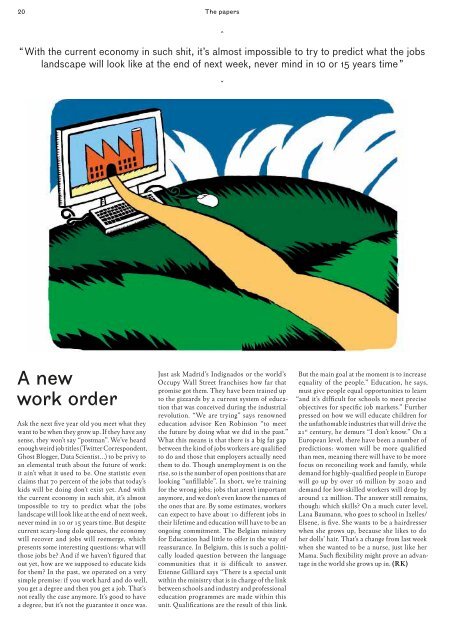Create successful ePaper yourself
Turn your PDF publications into a flip-book with our unique Google optimized e-Paper software.
20<br />
a new<br />
work order<br />
Ask the next five year old you meet what they<br />
want to be when they grow up. If they have any<br />
sense, they won’t say “postman”. We’ve heard<br />
enough weird job titles (Twitter Correspondent,<br />
Ghost Blogger, Data Scientist…) to be privy to<br />
an elemental truth about the future of work:<br />
it ain’t what it used to be. One statistic even<br />
claims that 70 percent of the jobs that today’s<br />
kids will be doing don’t exist yet. And with<br />
the current economy in such shit, it’s almost<br />
impossible to try to predict what the jobs<br />
landscape will look like at the end of next week,<br />
never mind in 10 or 15 years time. But despite<br />
current scary-long dole queues, the economy<br />
will recover and jobs will reemerge, which<br />
presents some interesting questions: what will<br />
those jobs be? And if we haven’t figured that<br />
out yet, how are we supposed to educate kids<br />
for them? In the p<strong>as</strong>t, we operated on a very<br />
simple premise: if you work hard and do well,<br />
you get a degree and then you get a job. That’s<br />
not really the c<strong>as</strong>e anymore. It’s good to have<br />
a degree, but it’s not the guarantee it once w<strong>as</strong>.<br />
<strong>The</strong> papers<br />
ˆ<br />
“ With the current economy in such shit, it’s almost impossible to try to predict what the jobs<br />
landscape will look like at the end of next week, never mind in 10 or 15 years time ”<br />
ˇ<br />
Just <strong>as</strong>k Madrid’s Indignados or the world’s<br />
Occupy Wall Street franchises how far that<br />
promise got them. <strong>The</strong>y have been trained up<br />
to the gizzards by a current system of education<br />
that w<strong>as</strong> conceived during the industrial<br />
revolution. “We are trying” says renowned<br />
education advisor Ken Robinson “to meet<br />
the future by doing what we did in the p<strong>as</strong>t.”<br />
What this means is that there is a big fat gap<br />
between the kind of jobs workers are qualified<br />
to do and those that employers actually need<br />
them to do. Though unemployment is on the<br />
rise, so is the number of open positions that are<br />
looking “unfillable”. In short, we’re training<br />
for the wrong jobs; jobs that aren’t important<br />
anymore, and we don’t even know the names of<br />
the ones that are. By some estimates, workers<br />
can expect to have about 10 different jobs in<br />
their lifetime and education will have to be an<br />
ongoing commitment. <strong>The</strong> Belgian ministry<br />
for Education had little to offer in the way of<br />
re<strong>as</strong>surance. In Belgium, this is such a politically<br />
loaded question between the language<br />
communities that it is difficult to answer.<br />
Etienne Gilliard says “<strong>The</strong>re is a special unit<br />
within the ministry that is in charge of the link<br />
between schools and industry and professional<br />
education programmes are made within this<br />
unit. Qualifications are the result of this link.<br />
But the main goal at the moment is to incre<strong>as</strong>e<br />
equality of the people.” Education, he says,<br />
must give people equal opportunities to learn<br />
“and it’s difficult for schools to meet precise<br />
objectives for specific job markets.” Further<br />
pressed on how we will educate children for<br />
the unfathomable industries that will drive the<br />
21 st century, he demurs “I don’t know.” On a<br />
European level, there have been a number of<br />
predictions: women will be more qualified<br />
than men, meaning there will have to be more<br />
focus on reconciling work and family, while<br />
demand for highly-qualified people in Europe<br />
will go up by over 16 million by 2020 and<br />
demand for low-skilled workers will drop by<br />
around 12 million. <strong>The</strong> answer still remains,<br />
though: which skills? On a much cuter level,<br />
Lana Baumann, who goes to school in Ixelles/<br />
Elsene, is five. She wants to be a hairdresser<br />
when she grows up, because she likes to do<br />
her dolls’ hair. That’s a change from l<strong>as</strong>t week<br />
when she wanted to be a nurse, just like her<br />
Mama. Such flexibility might prove an advantage<br />
in the world she grows up in. (RK)
















